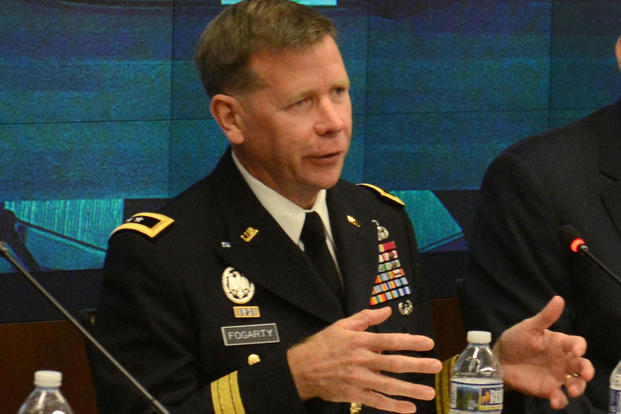The commander of Army Cyber Command said Thursday that the U.S. may be focusing too much on employing cyber as its only response to cyberattacks from foreign adversaries.
"A lot of times, when there is the breathless reporting of a cyberattack against our forces, against the commercial sector, the question is, 'What's your cyber response?' Maybe the cyber response is not the response that's most effective under the circumstances," Lt. Gen. Stephen Fogarty told an audience at the Association of the United States Army's event on Army Cyber and Networks.
Lawmakers have struggled with this issue since leaders from several intelligence agencies presented evidence that Russia used cyberattacks against the U.S. and spread disinformation to affect the outcome of the 2016 U.S. presidential election.
Fogarty said the U.S. should avoid the temptation to rely too heavily on cyber.
"We've got to be careful about boxing ourselves by the term cyber," he said, adding that he is even thinking about renaming Army Cyber Command because it places too much emphasis on cyber and not enough on the electronic warfare and information operations arms of the organization.
"We are under persistent attack from increasingly capable and aggressive adversaries, and I can't do this alone. ... It's not just about cyber," Fogarty said.
One of the most important priorities of his command is to defend the network, he added.
"It is our primary weapon system for U.S. DoD and certainly the Army," Fogarty said. "Without that weapon system functioning the way it is designed, I don't have effective mission command, I don't have persistent [intelligence, surveillance and reconnaissance], I don't have long-range precision fires -- all those other capabilities that we require as a modern military to dominate the battlespace.
"Every commander needs the ability to see himself and see the adversary," Fogarty said, adding that "our commanders' ability to sense, understand, decide and act faster than the adversary provides decisive advantage."
"It's not just in cyber space; it's the ability to have sensor-to-shooter links," he said. "I have to be able to find you, fix you, finish you faster than you can do the same to me, and that is across all domains -- certainly not just the cyber domain. So whatever the most capable system or most capable technique, tactic or procedure is, that is what we are going to employ. And it doesn't necessarily have to be cyber vs. cyber."
-- Matthew Cox can be reached at matthew.cox@military.com.










